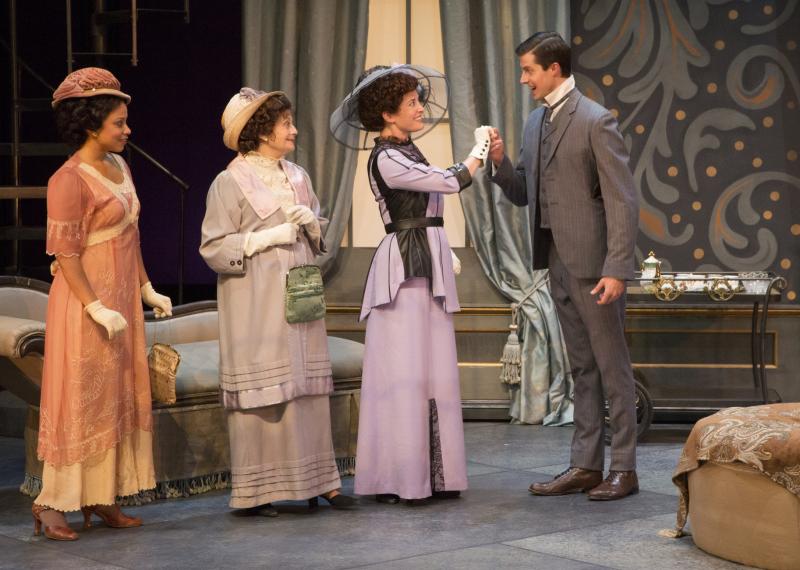'Pygmalion' At The Pasadena Playhouse Is A Modern Mythological Masterpiece

“And I treat a duchess as if she was a flower girl.”
These lines represent a conflict that the Pasadena Playhouse’s production of George Bernard Shaw’s acclaimed classic, “Pygmalion,” masterfully captures and broadens to almost epic proportions. The play, well known for Lerner and Loewe’s famous musical adaptation, “My Fair Lady,” borrows from the Greek myth of Pygmalion, a story about creation, love, and narcissism that depicts a sculptor becoming infatuated with his masterpiece.
Shaw’s version features the brutally patronizing and intellectually self-absorbed Professor Henry Higgins (Bruce Turk), a linguist specializing in the regional dialects of Great Britain. Higgins gets involved in a bet with fellow linguist Colonel Pickering (Stan Egi) that he, simply through phonetic training and speech lessons, can transform the lowly flower girl, Eliza Doolittle (Paige Lindsay White) into a lady so eloquent she could pass for a duchess at a ball. Higgins pulls Eliza from the streets and accepts her into his home, beginning the arduous task of removing her cockney accent and atrocious grammar and granting her “the divine gift of articulate speech” in what becomes an obsession-driven sociological experiment.
The Pasadena Playhouse brings this text to light in a delightful, yet tantalizingly dark and sinister manner. The sophisticated and uproarious comedy is comfortable ground for anyone familiar with “My Fair Lady,” but the production emphasizes the heavier, moralistic aspects of the play that Shaw originally intended.
SEE ALSO: Stop And Think: 'Stop Kiss' At The Pasadena Playhouse
The seamless flow of the production design serves as a haunting reminder that the audience is not only watching a comedy, but is in the middle of a social battleground that challenges the very fabric of English society. Stephanie Kerley Schwartz’s breathtaking scenic design has an unspoken mechanistic quality that hints at Shaw’s Marxist leanings. Higgins’s experiment becomes far more than a simple exercise in phonetics; it is an attempt to use language to break social boundaries and give the individual mobility in a rigid class system. This idea is backed up by Kaitlyn Pietras’s powerful animated projections. Scene changes are covered by falling words of text that pour over the proscenium, adding an emotional fragility to the ambience of the play and begging the question, “What is the role of language in a world with such strict socio-economic boundaries?” Is it, as Higgins seems to suggest, a means of liberating the individual from the chains of birth, or is it possible that Higgins’s experiments demonstrate that language, too, like the people who use it, has become a commodity?
Although the brilliant design of the show would have been sufficient, the performances that Jessica Kubzansky’s direction wrenches from the cast are a spectacle of their own. Bruce Turk is a brilliant and complicating Higgins, an abominable snob who is difficult not to love, despite his adolescent behavior and abhorrent demeanor towards others. His equal-treatment philosophy of regarding even aristocrats as dirt becomes his own weapon in the fight against classism, and yet his obsessive possessiveness of Eliza reveals a deeply narcissistic personality that yearns for an elitist greatness. Paige Lindsey White’s Eliza, the Apollo to his Dionysus, provides a stark contrast in her chiseled grace. Her transformation from the lowly Eliza Doolittle of the streets into a lady of the English middle class is astonishing and elegant, but still hints at an uncertainty as to whether she will truly be able to stand on her own two feet after what Higgins has done to her. Time Winters as Alfred P. Doolittle, Eliza’s unscrupulous but jovial father, is both a hilarious delight and a profound exception to the “rules” and expectations of social class.
SEE ALSO: It's Too Darn Hot: 'Kiss Me, Kate' At The Pasadena Playhouse
This “Pygmalion” is one of the most bold, insightful, and rewarding theatrical experiences of the season. The fluid interplay between comedy and tragedy, one that blurs the lines between where the laughs end and the solemn considerations begin, truly illuminates Shaw’s use of traditional form to mask a vehicle for social change. The Pasadena Playhouse’s production asks us to examine the Henry Higgins and Eliza Doolittle inside all of us—our ability to transform, our need to control, and the way in which we regard human life. Shaw’s relevance, having experienced little diminution over the last century that we have been producing his plays, shines the brightest in “Pygmalion,” and even he, with his fiery temper and near-impossibility to please, would have to admit that this production is a triumph.
"Pygmalion" is playing through April 12 at the Pasadena Playhouse (39 South El Molina Avenue, Pasadena). Tickets are $30 - $125. For more information visit www.PasadenaPlayhouse.org
Contact Staff Reporter Ryan David McRee here
For more Theater & Dance coverage click here



